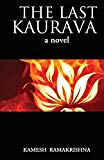The Last Kaurava a Novel
From the Introduction by the Author: The Last Kaurava is a novel set against the background ofa crisis circa 2000 BCE caused by the drying up of the Sarasvati. Hastinapur on the Ganga is a frontier town that is overwhelmed by immigrants. Social policies set to manage the crisis fail and set the stage for the Great War that destroyed one civilisation and established the first empire in the region. A frame story, set in 850 BCE (over a thousand years afterthe Great War) reimagines the meta-episode in the epic of how the god Ganesha agreed to be Vyaasa’s scribe, subject to unusual conditions. I connect what might be a metaphor to known events from a time when the city of Hastinapur (literally, The Elephant City, or perhaps, Ganesha’s city), was destroyed in a flood. Its oral archives including an epic poem about the Great War, held in human memory by the guild of bards was threatened with extinction as almost all the bards of Hastinapur had died. The solution was to write it down. But how? I imagined a highly evolved, non-literate and orally basedculture in 850 BCE, utterly unlike its “literate†Western (i.e., Persian, Assyrian, Greek, etc.) contemporaries. The decision to write down the memorised archives was not just a break with tradition. The bards did not know any script, they could neither read nor write and needed help – just like Vyaasa needed Ganesha’s help in the original. Vyaasa called upon Ganesha to be the scribe – the bards asked the Elephant City to provide the scribes who would write down as they recited. This was an expensive proposition that the city was unhappy with and every delay or slowdown would provoke demands to end the project – just like Ganesha’s demand for non-stop recitation of the poem by Vyaasa. The guild of bards cooperated with the guild of traders and merchants to solve problems that arose. The solution? It’s in this novel. I followed some ground rules. Nothing fantastic – nogods, goddesses, or demons; no magic; no magical weapons; nomiraculous conceptions; no karmic explanations. Situating the Great War in 2000 BCE limited the technologies available – for instance, no nuclear weapons, but more to the point, no horses or iron or million-man armies. Iron was scarce or unknown; armies were small; horse-drawn war chariots would not exist for another two hundred years; transportation was by carts drawn by oxen or onagers (the “Asian wild assâ€). The people were not all that different from us – they loved, they hated, they were kind, they got angry, they acted without thinking, they plotted, they lied, they demanded the truth, etc. Not better than us, andnot worse either. They were just like us.The result is this novel.

